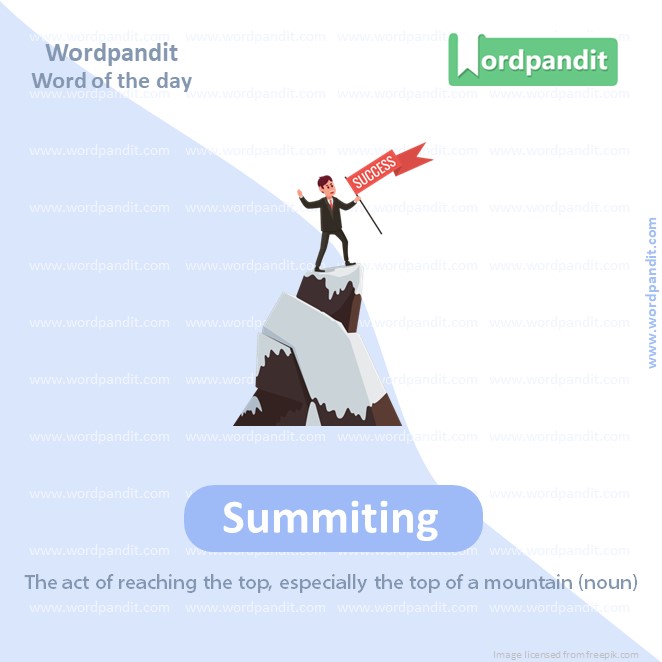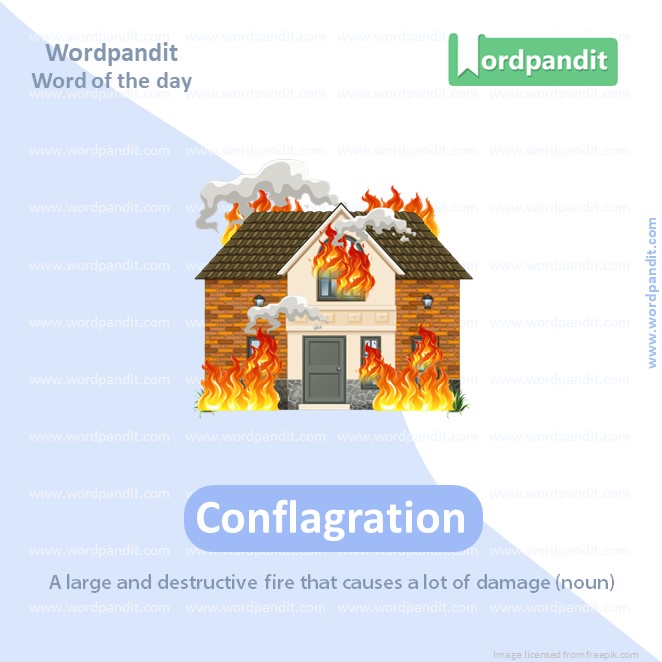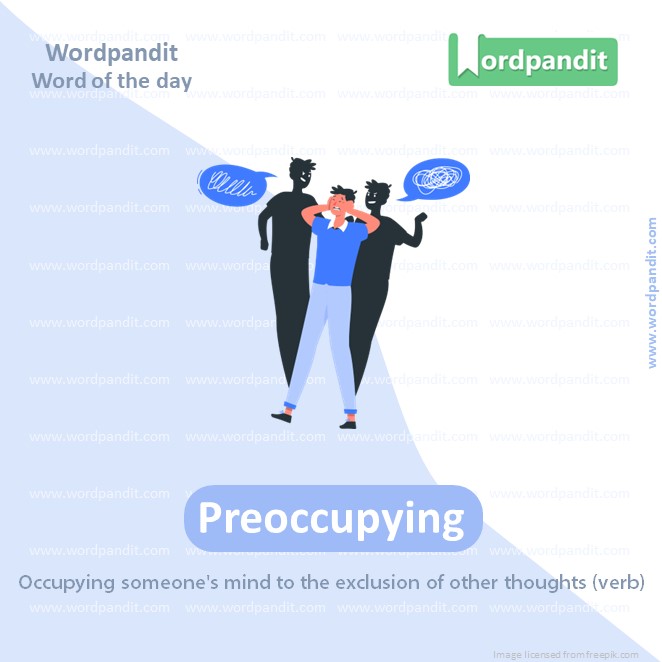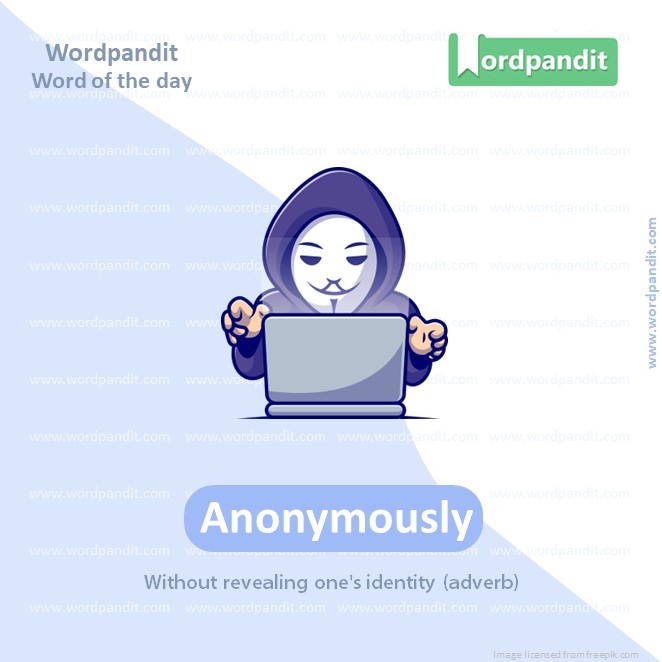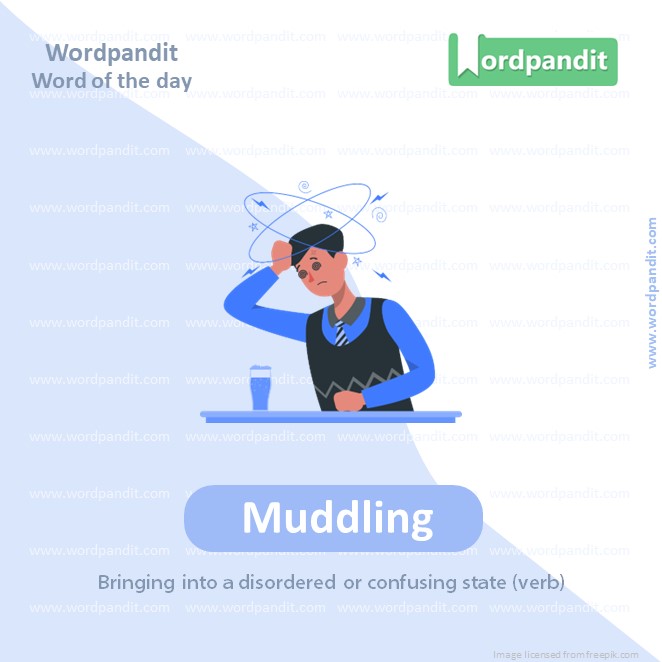Daily Vocabulary from International Newspapers and Publications
Expand Your Vocabulary with Wordpandit’s Global Vocabulary Hub
At Wordpandit, we are committed to helping you develop a truly global vocabulary by drawing from some of the most respected international publications. This section is designed to keep you ahead of the curve by introducing you to words that define global conversations and trends.
The Power of Global Sources
To help you think and communicate on a global scale, we curate vocabulary from renowned international sources, such as:
- The New York Times
- The Washington Post
- BBC
- The Guardian
- The Economist
- Scientific American
- Psychology Today
- And many more...
Stay Global, Stay Competitive
Our daily updates from international publications ensure you are consistently exposed to new words that reflect global news and developments, making sure your vocabulary is not only current but also globally relevant.
Enhance Your Global Perspective
Whether you’re preparing for international exams, aiming to excel in global business communication, or want to enhance your language skills for personal growth, Wordpandit offers the resources you need to thrive in a global context.
Effective Learning, Global Reach
Our learning methodology combines global examples, memory aids, and interactive activities, allowing you to internalize new words effectively and apply them in real-world scenarios.
Begin Your Global Vocabulary Journey Now!
Why Choose Wordpandit?
Practical Learning: Focus on words you'll actually encounter in real-world reading, enhancing your comprehension and communication skills.
Diverse Content: From current affairs to scientific breakthroughs, our varied sources expose you to vocabulary across multiple domains.
Effortless Integration: Make Wordpandit a part of your daily routine. Just a few minutes each day can significantly boost your lexicon over time.
Your Path to Vocabulary Mastery
- Visit our Daily Vocabulary section regularly
- Explore new words and their usage in context
- Practice incorporating these words into your own writing and speech
- Track your progress as your vocabulary expands
Start Your Journey Today
Embark on your vocabulary enhancement journey with Wordpandit. By consistently engaging with our daily posts, you'll build a robust vocabulary that serves you well in academic, professional, and personal contexts.
Remember, a word a day keeps linguistic limitations at bay. Make Wordpandit your daily companion in the quest for vocabulary excellence!
WORD-1: Summiting
Context:
"Teams reporting higher feelings of group belonging repeatedly outperform other teams because their members share more of their unique information about summiting Everest." - The Guardian
Explanatory Paragraph:
"Summiting" refers to the act of reaching the summit, or the highest point, of a mountain. In the context of the sentence, it’s specifically used to describe the achievement of reaching the top of Mount Everest. The word carries connotations of triumph, perseverance, and overcoming challenges. It’s often used in both literal and metaphorical contexts to describe achieving a major goal.
Meaning: The act of reaching the summit or top of a mountain (Verb – gerund/present participle form of "summit")
Pronunciation: SUH-mi-ting
Difficulty Level: ⭐⭐ Beginner
Etymology: Derived from the noun “summit,” which comes from the Latin word *summus*, meaning “highest.” The verb form evolved to mean “to reach the top of something.”
Prashant Sir's Notes:
“Summiting” is an inspiring word—both a physical and metaphorical marker of success. Whether climbing mountains or achieving goals in life, it reflects reaching the peak after a journey of effort. Keep an eye out for how it’s used metaphorically too.
Synonyms & Antonyms:
Synonyms: reaching the peak, climbing, scaling, ascending
Antonyms: descending, retreating, falling, backing down
Usage Examples:
- After months of training, the team finally succeeded in summiting Mount Kilimanjaro.
- Summiting the corporate ladder often requires both strategy and persistence.
- He shared his story of summiting personal fears during the leadership workshop.
- Only a few climbers attempted summiting the peak during the harsh winter season.
Cultural Reference:
"Summiting Everest has become a symbol of human endurance and ambition." - National Geographic
Think About It:
What’s your personal Everest—what challenge would feel like summiting a mountain if you achieved it?
Quick Activity:
Write down three goals you’ve achieved in life and describe each as if you were "summiting" something. For example: “Summiting my final exams” or “Summiting my first job interview.”
Memory Tip:
Think of “summiting” as “summit + ing” – doing the act of reaching the summit. Picture someone raising a flag on the mountain top to lock in the meaning.
Real-World Application:
“Summiting” is often used in outdoor adventure communities, motivational speeches, and business language to describe reaching the pinnacle of a goal. It’s a powerful metaphor for achievement in many areas of life.
WORD-2: Conflagration
Context:
"The Houthis in Yemen this month, fears of a larger regional conflagration are steadily growing." - The Guardian
Explanatory Paragraph:
“Conflagration” refers to a large, destructive fire, but in a broader and more figurative sense, it is often used to describe a violent conflict or war that spreads widely. In the context of the sentence, it suggests that localized tensions involving the Houthis could escalate into a much larger and more destructive regional war or conflict.
Meaning: A large and destructive fire; a widespread and intense conflict (Noun)
Pronunciation: kon-fluh-GRAY-shun
Difficulty Level: ⭐⭐⭐⭐ Advanced
Etymology: From Latin *conflagratio*, meaning "a burning up", from *conflagrare* — *con-* (together) + *flagrare* (to burn).
Prashant Sir's Notes:
This is a powerful word that transitions easily from literal fire to metaphorical fire. When you see “conflagration” in news or literature, it’s often describing a situation that has spiraled out of control—especially wars, social unrest, or massive conflicts.
Synonyms & Antonyms:
Synonyms: inferno, blaze, wildfire, conflict, war, upheaval
Antonyms: peace, calm, truce, harmony, resolution
Usage Examples:
- The civil war quickly turned into a regional conflagration involving multiple countries.
- Firefighters struggled to contain the forest conflagration that spread across three states.
- Diplomats are working to prevent a diplomatic dispute from igniting into a full-blown conflagration.
- Historical records detail the conflagration that destroyed much of ancient Rome.
Cultural Reference:
"The First World War was a global conflagration that changed the course of history." – Common historical analysis
Think About It:
Why do you think metaphors of fire—like “conflagration”—are so commonly used to describe conflict or war?
Quick Activity:
Match the word “conflagration” to its correct usage in these contexts: A) A literal forest fire, B) A heated political debate, C) A regional war. Can it be used in all three? Reflect and jot down your answer.
Memory Tip:
Think of “conflagration” as “flag” + “rage” + “tion” — imagine a flag burning in rage, sparking a massive fire or conflict.
Real-World Application:
“Conflagration” is used in journalism, political analysis, and literature to describe situations where violence or destruction spreads rapidly. Understanding this term helps in interpreting global events and historical narratives more precisely.
WORD-3: Preoccupying
Context:
"At the heart of Iran’s aversion to a major conflict are the domestic issues that have been preoccupying the regime." - The Guardian
Explanatory Paragraph:
"Preoccupying" refers to something that takes up one's attention or thoughts to such a degree that it becomes difficult to focus on other matters. In the context of the sentence, domestic issues are so concerning or demanding that they dominate the Iranian regime's focus, making them less willing to engage in a broader conflict. It suggests a mental or emotional occupation with a particular issue or concern.
Meaning: Occupying the mind or attention excessively or before other things (Adjective/Verb - present participle of "preoccupy")
Pronunciation: pree-OK-yuh-pie-ing
Difficulty Level: ⭐⭐⭐ Intermediate
Etymology: From Latin *praeoccupare*, meaning "to seize beforehand"; *prae-* (before) + *occupare* (to occupy).
Prashant Sir's Notes:
This is a very useful word in both academic and everyday contexts. When something is "preoccupying," it usually implies a dominating concern—whether it's political instability, financial worries, or even personal anxieties. The verb "preoccupy" and its related forms help us describe mental focus in a nuanced way.
Synonyms & Antonyms:
Synonyms: absorbing, consuming, distracting, concerning, engaging
Antonyms: relaxing, soothing, untroubling, freeing, releasing
Usage Examples:
- The looming economic crisis has been preoccupying policymakers for months.
- What’s preoccupying your mind so much that you didn’t hear the question?
- The most preoccupying issue for residents was the lack of clean water.
- Her preoccupying thoughts made it difficult for her to concentrate in class.
Cultural Reference:
“In George Orwell’s *1984*, the constant surveillance and threat of punishment are preoccupying forces in the minds of citizens, controlling their actions and thoughts.” - Literary Analysis
Think About It:
What is something that often preoccupies your thoughts, and how does it affect your ability to focus on other things?
Quick Activity:
Write down three things that have been preoccupying your mind recently. Are they positive, negative, or neutral? Try to use the word “preoccupying” in a short sentence for each.
Memory Tip:
Break it down: “pre-” (before) + “occupying” — it’s something that occupies your mind *before* you can focus on anything else.
Real-World Application:
“Preoccupying” is a valuable word in journalism, psychology, and daily conversation. Whether describing political tensions or personal anxieties, it helps express mental engagement or concern effectively.
WORD-4: Anonymously
Context:
"This latest group of federal workers, however, organized a protest in their capacities as government officials yet did so anonymously to avoid being held responsible." - The Guardian
Explanatory Paragraph:
“Anonymously” means doing something without revealing your identity. In the sentence, the federal workers protested without disclosing who they were, likely to protect their jobs or avoid negative consequences. This word is commonly used in contexts where individuals want to contribute, speak up, or act without drawing attention to themselves personally.
Meaning: In a way that does not reveal one's name or identity (Adverb)
Pronunciation: uh-NON-uh-muss-lee
Difficulty Level: ⭐⭐ Beginner
Etymology: From Greek *anōnumos* ("nameless") — *an-* (without) + *onyma* (name), later adapted through Latin and French forms.
Prashant Sir's Notes:
This word appears a lot in media, legal discussions, and online platforms. Doing something “anonymously” can be protective or even empowering, but it can also raise questions of credibility or accountability. It’s useful to think about the motivation behind staying anonymous.
Synonyms & Antonyms:
Synonyms: secretly, without identification, incognito, namelessly
Antonyms: openly, publicly, identified, known
Usage Examples:
- The whistleblower submitted the documents anonymously to protect their safety.
- She donated a large sum of money anonymously to the hospital.
- The feedback form allows students to respond anonymously.
- He published his first story anonymously, unsure of how it would be received.
Cultural Reference:
“Anonymous” is also the name of a decentralized activist group known for online protests, hacking campaigns, and global digital resistance. They act anonymously to avoid surveillance and protect individual members.
Think About It:
When is acting anonymously ethical and protective—and when might it be seen as avoiding responsibility?
Quick Activity:
Think of three real-world examples where someone might choose to act anonymously (e.g., online forums, donations, whistleblowing). Write one sentence for each using the word “anonymously.”
Memory Tip:
“Anonymously” comes from “anonymous” — think of “no name” (a + name = no name). Visualize a person with their face hidden or blurred out to recall the idea of hidden identity.
Real-World Application:
“Anonymously” is widely used in legal, political, digital, and journalistic contexts. Whether someone is submitting a tip, giving feedback, or sharing an opinion online, this word captures the act of remaining unnamed while participating.
WORD-1: Summiting
Context:
"Teams reporting higher feelings of group belonging repeatedly outperform other teams because their members share more of their unique information about summiting Everest." - The Guardian
Explanatory Paragraph:
"Summiting" refers to the act of reaching the summit, or the highest point, of a mountain. In the context of the sentence, it’s specifically used to describe the achievement of reaching the top of Mount Everest. The word carries connotations of triumph, perseverance, and overcoming challenges. It’s often used in both literal and metaphorical contexts to describe achieving a major goal.
Meaning: The act of reaching the summit or top of a mountain (Verb – gerund/present participle form of "summit")
Pronunciation: SUH-mi-ting
Difficulty Level: ⭐⭐ Beginner
Etymology: Derived from the noun “summit,” which comes from the Latin word *summus*, meaning “highest.” The verb form evolved to mean “to reach the top of something.”
Prashant Sir's Notes:
“Summiting” is an inspiring word—both a physical and metaphorical marker of success. Whether climbing mountains or achieving goals in life, it reflects reaching the peak after a journey of effort. Keep an eye out for how it’s used metaphorically too.
Synonyms & Antonyms:
Synonyms: reaching the peak, climbing, scaling, ascending
Antonyms: descending, retreating, falling, backing down
Usage Examples:
- After months of training, the team finally succeeded in summiting Mount Kilimanjaro.
- Summiting the corporate ladder often requires both strategy and persistence.
- He shared his story of summiting personal fears during the leadership workshop.
- Only a few climbers attempted summiting the peak during the harsh winter season.
Cultural Reference:
"Summiting Everest has become a symbol of human endurance and ambition." - National Geographic
Think About It:
What’s your personal Everest—what challenge would feel like summiting a mountain if you achieved it?
Quick Activity:
Write down three goals you’ve achieved in life and describe each as if you were "summiting" something. For example: “Summiting my final exams” or “Summiting my first job interview.”
Memory Tip:
Think of “summiting” as “summit + ing” – doing the act of reaching the summit. Picture someone raising a flag on the mountain top to lock in the meaning.
Real-World Application:
“Summiting” is often used in outdoor adventure communities, motivational speeches, and business language to describe reaching the pinnacle of a goal. It’s a powerful metaphor for achievement in many areas of life.
WORD-2: Conflagration
Context:
"The Houthis in Yemen this month, fears of a larger regional conflagration are steadily growing." - The Guardian
Explanatory Paragraph:
“Conflagration” refers to a large, destructive fire, but in a broader and more figurative sense, it is often used to describe a violent conflict or war that spreads widely. In the context of the sentence, it suggests that localized tensions involving the Houthis could escalate into a much larger and more destructive regional war or conflict.
Meaning: A large and destructive fire; a widespread and intense conflict (Noun)
Pronunciation: kon-fluh-GRAY-shun
Difficulty Level: ⭐⭐⭐⭐ Advanced
Etymology: From Latin *conflagratio*, meaning "a burning up", from *conflagrare* — *con-* (together) + *flagrare* (to burn).
Prashant Sir's Notes:
This is a powerful word that transitions easily from literal fire to metaphorical fire. When you see “conflagration” in news or literature, it’s often describing a situation that has spiraled out of control—especially wars, social unrest, or massive conflicts.
Synonyms & Antonyms:
Synonyms: inferno, blaze, wildfire, conflict, war, upheaval
Antonyms: peace, calm, truce, harmony, resolution
Usage Examples:
- The civil war quickly turned into a regional conflagration involving multiple countries.
- Firefighters struggled to contain the forest conflagration that spread across three states.
- Diplomats are working to prevent a diplomatic dispute from igniting into a full-blown conflagration.
- Historical records detail the conflagration that destroyed much of ancient Rome.
Cultural Reference:
"The First World War was a global conflagration that changed the course of history." – Common historical analysis
Think About It:
Why do you think metaphors of fire—like “conflagration”—are so commonly used to describe conflict or war?
Quick Activity:
Match the word “conflagration” to its correct usage in these contexts: A) A literal forest fire, B) A heated political debate, C) A regional war. Can it be used in all three? Reflect and jot down your answer.
Memory Tip:
Think of “conflagration” as “flag” + “rage” + “tion” — imagine a flag burning in rage, sparking a massive fire or conflict.
Real-World Application:
“Conflagration” is used in journalism, political analysis, and literature to describe situations where violence or destruction spreads rapidly. Understanding this term helps in interpreting global events and historical narratives more precisely.
WORD-3: Preoccupying
Context:
"At the heart of Iran’s aversion to a major conflict are the domestic issues that have been preoccupying the regime." - The Guardian
Explanatory Paragraph:
"Preoccupying" refers to something that takes up one's attention or thoughts to such a degree that it becomes difficult to focus on other matters. In the context of the sentence, domestic issues are so concerning or demanding that they dominate the Iranian regime's focus, making them less willing to engage in a broader conflict. It suggests a mental or emotional occupation with a particular issue or concern.
Meaning: Occupying the mind or attention excessively or before other things (Adjective/Verb - present participle of "preoccupy")
Pronunciation: pree-OK-yuh-pie-ing
Difficulty Level: ⭐⭐⭐ Intermediate
Etymology: From Latin *praeoccupare*, meaning "to seize beforehand"; *prae-* (before) + *occupare* (to occupy).
Prashant Sir's Notes:
This is a very useful word in both academic and everyday contexts. When something is "preoccupying," it usually implies a dominating concern—whether it's political instability, financial worries, or even personal anxieties. The verb "preoccupy" and its related forms help us describe mental focus in a nuanced way.
Synonyms & Antonyms:
Synonyms: absorbing, consuming, distracting, concerning, engaging
Antonyms: relaxing, soothing, untroubling, freeing, releasing
Usage Examples:
- The looming economic crisis has been preoccupying policymakers for months.
- What’s preoccupying your mind so much that you didn’t hear the question?
- The most preoccupying issue for residents was the lack of clean water.
- Her preoccupying thoughts made it difficult for her to concentrate in class.
Cultural Reference:
“In George Orwell’s *1984*, the constant surveillance and threat of punishment are preoccupying forces in the minds of citizens, controlling their actions and thoughts.” - Literary Analysis
Think About It:
What is something that often preoccupies your thoughts, and how does it affect your ability to focus on other things?
Quick Activity:
Write down three things that have been preoccupying your mind recently. Are they positive, negative, or neutral? Try to use the word “preoccupying” in a short sentence for each.
Memory Tip:
Break it down: “pre-” (before) + “occupying” — it’s something that occupies your mind *before* you can focus on anything else.
Real-World Application:
“Preoccupying” is a valuable word in journalism, psychology, and daily conversation. Whether describing political tensions or personal anxieties, it helps express mental engagement or concern effectively.
WORD-4: Anonymously
Context:
"This latest group of federal workers, however, organized a protest in their capacities as government officials yet did so anonymously to avoid being held responsible." - The Guardian
Explanatory Paragraph:
“Anonymously” means doing something without revealing your identity. In the sentence, the federal workers protested without disclosing who they were, likely to protect their jobs or avoid negative consequences. This word is commonly used in contexts where individuals want to contribute, speak up, or act without drawing attention to themselves personally.
Meaning: In a way that does not reveal one's name or identity (Adverb)
Pronunciation: uh-NON-uh-muss-lee
Difficulty Level: ⭐⭐ Beginner
Etymology: From Greek *anōnumos* ("nameless") — *an-* (without) + *onyma* (name), later adapted through Latin and French forms.
Prashant Sir's Notes:
This word appears a lot in media, legal discussions, and online platforms. Doing something “anonymously” can be protective or even empowering, but it can also raise questions of credibility or accountability. It’s useful to think about the motivation behind staying anonymous.
Synonyms & Antonyms:
Synonyms: secretly, without identification, incognito, namelessly
Antonyms: openly, publicly, identified, known
Usage Examples:
- The whistleblower submitted the documents anonymously to protect their safety.
- She donated a large sum of money anonymously to the hospital.
- The feedback form allows students to respond anonymously.
- He published his first story anonymously, unsure of how it would be received.
Cultural Reference:
“Anonymous” is also the name of a decentralized activist group known for online protests, hacking campaigns, and global digital resistance. They act anonymously to avoid surveillance and protect individual members.
Think About It:
When is acting anonymously ethical and protective—and when might it be seen as avoiding responsibility?
Quick Activity:
Think of three real-world examples where someone might choose to act anonymously (e.g., online forums, donations, whistleblowing). Write one sentence for each using the word “anonymously.”
Memory Tip:
“Anonymously” comes from “anonymous” — think of “no name” (a + name = no name). Visualize a person with their face hidden or blurred out to recall the idea of hidden identity.
Real-World Application:
“Anonymously” is widely used in legal, political, digital, and journalistic contexts. Whether someone is submitting a tip, giving feedback, or sharing an opinion online, this word captures the act of remaining unnamed while participating.
WORD-5: Muddling
Context:
"They were intentionally muddling that boundary." - The Guardian
Explanatory Paragraph:
“Muddling” refers to the act of making something confusing, unclear, or disorganized. In the context of the sentence, it means deliberately making a boundary less distinct or more confusing—perhaps to blur lines between what is acceptable and what is not. This word is often used to describe confused thinking, unclear actions, or a state of disorder, whether intentional or accidental.
Meaning: Making something confused or unclear; mixing things up (Verb – present participle of "muddle")
Pronunciation: MUH-dl-ing
Difficulty Level: ⭐⭐ Beginner
Etymology: From Middle English *mudden* (to bathe in mud), probably related to “mud.” Later evolved to mean “to confuse or mix up.”
Prashant Sir's Notes:
“Muddling” is a word you’ll find in political debates, academic essays, and daily conversation. It often implies not just confusion, but a lack of clarity created either unintentionally—or in some cases, on purpose. Pay attention to context!
Synonyms & Antonyms:
Synonyms: confusing, mixing up, jumbling, complicating, obscuring
Antonyms: clarifying, organizing, simplifying, untangling, streamlining
Usage Examples:
- By mixing facts with opinions, the speaker was muddling the real issue.
- He kept muddling the instructions, making it hard for anyone to follow.
- The two departments are muddling their responsibilities, leading to inefficiency.
- She was muddling through her tasks, unsure of the right order to complete them.
Cultural Reference:
In Winston Churchill’s words: “You can always count on Americans to do the right thing—after they’ve tried everything else.” This quote humorously reflects the idea of “muddling through,” a British phrase suggesting progress despite confusion or disorder.
Think About It:
Have you ever noticed a situation where someone seemed to be intentionally muddling the truth? What might their motivation have been?
Quick Activity:
Think of a task or project where you felt confused. Write a sentence describing that moment using “muddling.” For example: “I was muddling through the math assignment without fully understanding the formulas.”
Memory Tip:
Think of "muddling" as stepping into a puddle of mud—things get messy, unclear, and difficult to navigate. The mental image of “mud” helps lock in the meaning.
Real-World Application:
“Muddling” is often used in news, management, and personal situations. Whether describing a confusing political stance or someone struggling to get through a chaotic day, it captures the sense of disorder or blurred understanding effectively.



